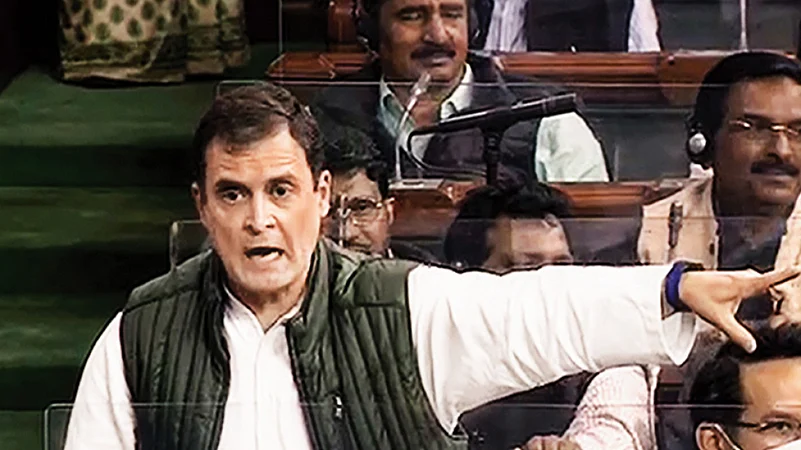On February 2, Congress leader Rahul Gandhi sparked outrage when he slammed the BJP, claiming that the party cannot see India as its “kingdom” because it is a union of states. Gandhi emphasised the necessity of cooperative federalism, claiming that India has only been ruled through dialogue for decades. Amit Malviya, the in-charge of the BJP’s national information and technology department, took to Twitter shortly after, to say that the Congress MP’s claim that it was “not a nation but a union of states” was “very problematic and dangerous”. He claimed that the Congress leader hasn’t “comprehended the Constitution”.
The furore over federalism has also reignited an old debate around the distribution of legislative, executive and administrative powers between the Centre and states and the much-contested Concurrent List in the backdrop of the farm laws, NEET exams and health sector, among others. It is pertinent to mention that the Concurrent List includes subjects of common interest to both the Union and state governments. Education, including technical, medical, universities, population control and family planning, criminal law, animal cruelty prevention, wildlife, animal protection, and forests, are topics on the Concurrent List. The Concurrent List lists 52 items found in the Seventh Schedule of the Indian Constitution. Union List, State List, and Concurrent List are the three lists that make up the legislative sector. However, education was earlier the states’ responsibility and put in the Concurrent List only during the Emergency (1975-1977).
The NEET (National Eligibility cum Entrance Test conducted for granting admission in medical UG seats of India) has once again taken centre stage in Tamil Nadu with a high-pitched campaign for the urban local body elections centred around the Concurrent List. NEET has been a sensitive issue in the southern state since 2013 when all medical entrance tests were merged into a single national-level examination. The Tamil Nadu government had formed the Justice A.K. Rajan Committee to investigate the impact of NEET on medical admissions in the state. According to the report, NEET has “obviously damaged” socio-economic representation in MBBS and further medical studies, favouring primarily the wealthy.
The findings of the report also says that NEET harms Tamil-medium and students from rural backgrounds, government schools, students whose parent’s annual income is less than Rs 2.5 lakh. Also adversely affected are students from the Most Backward Classes, Scheduled Castes, and Scheduled Tribes. “Tamil Nadu’s healthcare system will be seriously damaged if NEET is not abolished, and there may not be enough doctors to be posted at primary health centres or government hospitals. The rural and urban poor may not be able to enrol in medical courses,” the report mentions.
NEET became a burning electoral issue in Tamil Nadu after Governor R.N. Ravi returned the government’s Bill in the assembly to abolish NEET from the state earlier this month. One of the main focuses of the All India Anna Dravida Munnetra Kazhagam (AIADMK) campaign is the continuation of the NEET exam against the DMK’s assurance of nixing it. During his virtual campaigns, chief minister M.K. Stalin has been spending quite some time refuting the claim made by leader of the Opposition Edappadi K. Palaniswami that NEET was implemented by the UPA government of which DMK was a part. “Can Palaniswami show me one exam centre in Tamil Nadu where NEET was held during the previous DMK rule?” Stalin asked, noting that the examination was only introduced in the state when Palaniswami was the chief minister. Former chief minister and AIADMK coordinator O. Panneerselvam has said that “NEET is a problem that the DMK cannot solve. The Bill is merely a token gesture”.

Commenting on the issue, Professor Faizan Mustafa, vice chancellor of Nalsar University of Law, says that the Bill on exemption of NEET by the Tamil Nadu government is merely a political statement and that practically it cannot pass the scrutiny of law. “Constitutionally, education is on the Concurrent list, both the state and central government can form laws around it. However, if there is a dispute between the laws, the Centre can override the state law under Article 254,” Mustafa tells Outlook.
Nevertheless, the Constitution also gives powers to the state under section 254(2) to bypass the Centre. It states that if the central legislation and a state statute are both on the same Concurrent List subject and have contradictory provisions, the President may approve the state law. “In this case, even if the governor forwards the state’s Bill to the President, he will not approve it in consultation with the central government; hence the Bill passed by Tamil Nadu against NEET exams is merely a political statement,” Prof. Mustafa adds.
Earlier, the year-long farmers’ protest against three controversial laws introduced by the central government had also stoked a debate around the legal validity of the legislations. The laws were challenged in the Supreme Court before the government succumbed to pressure from the agitation and withdrew the three laws.
Earlier, there was talk about a Central government proposal to put agriculture under the purview of the Concurrent list before the Parliament passed the farm laws. On May 5, 2015, the government had told the Lok Sabha that the National Commission of Farmers (Swaminathan Commission) had recommended ‘agricultural market’ to be added to the Concurrent List. However, the proposals had made it clear that “foodstuffs” under Entry 33 of the Concurrent List do not provide Parliament with the jurisdiction to legislate on agricultural markets. Nevertheless, the government told the Lok Sabha on March 27, 2018, that it had no plans to add the term “agricultural market” to the Concurrent List. Later, In September 2020, the President approved the contentious farm bills that the Parliament approved into laws.
More recently, there have also been talks about bringing health under the Concurrent List. In 2020, a high-level group constituted for the health sector by the 15th Finance Commission has recommended that “health” be moved from the State List to the Concurrent List. In a report given to the Finance Commission, the panel stated that health should also be on the concurrent list because medical education and family planning matters fall under the same.
Public health and related matters, such as dispensaries and hospitals, are currently the responsibility of the states under the Indian Constitution’s Seventh Schedule. Preventing infectious and contagious diseases from spreading from one state to another, on the other hand, is included in the concurrent list. In practice, the Centre has always taken an active role in influencing public health policies. The Centre establishes national standards and a governance framework for issues, which are later implemented by the states.
In March 2021, the 15th Finance Commission chairman N.K. Singh said that health should be moved to the Concurrent List under the Constitution, and a developmental finance institution (DFI) specialised in healthcare investments should be established. Singh said that increasing government expenditure on health to 2.5 per cent of GDP by 2025 should be a fundamental commitment of all States, with primary healthcare receiving at least two-thirds of such investment. The demand for health to be put under concurrent list gained momentum in the aftermath of the second wave of Covid-19 in 2021, when the health system crumbled in the country and states allegedly failed in dealing with the pandemic.
Amid all this, there are also demands from a section of politicians to abolish the Concurrent List altogether. After being re-elected as chief minister of Telangana in 2018, K. Chandrashekar Rao made it clear that his party’s victory meant working for a new non-Congress, a non-BJP national consortium of regional parties. And that he would push for further state autonomy, suggesting complete abolition of the Concurrent List. “National parties want to strengthen the Concurrent List so that the Centre has a maximum hold over states. But, in my view, there should be no Concurrent List, and state governments should be able to decide what is best for their states,” he had said.
However, experts believe that doing away with the Concurrent List would not strengthen the states but cause chaos. Venkatesh Nayak, a transparency activist and legal expert with the Commonwealth Human Rights Initiative, believes that the states and the Centre work together on many subjects. And it’s not just about making or implementing legislation but also about generating enough resources to implement them. “What KCR said after his victory in 2018 is not very new. Similar demands have existed since non-Congress governments were formed in states like Karnataka, Andhra Pradesh and Jammu and Kashmir. Then N.T. Ramarao, Ramakrishna Hegde and others had floated a front for decentralising power. What KCR is suggesting does not seem very practical. There are issues and subjects where states and the Centre work together. All states cannot generate enough resources to implement the infrastructure for everything without support from the central government,” Nayak explains.
(This appeared in the print edition as "The Sacred List")

























